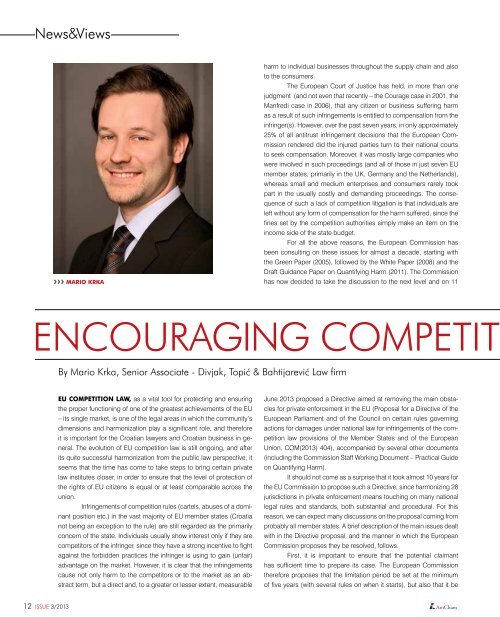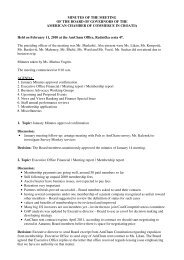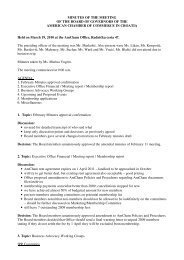No. 3 / 2013 - AmCham
No. 3 / 2013 - AmCham
No. 3 / 2013 - AmCham
- No tags were found...
Create successful ePaper yourself
Turn your PDF publications into a flip-book with our unique Google optimized e-Paper software.
News&Views››› Mario Krkaharm to individual businesses throughout the supply chain and alsoto the consumers.The European Court of Justice has held, in more than onejudgment (and not even that recently – the Courage case in 2001, theManfredi case in 2006), that any citizen or business suffering harmas a result of such infringements is entitled to compensation from theinfringer(s). However, over the past seven years, in only approximately25% of all antitrust infringement decisions that the European Commissionrendered did the injured parties turn to their national courtsto seek compensation. Moreover, it was mostly large companies whowere involved in such proceedings (and all of those in just seven EUmember states, primarily in the UK, Germany and the Netherlands),whereas small and medium enterprises and consumers rarely tookpart in the usually costly and demanding proceedings. The consequenceof such a lack of competition litigation is that individuals areleft without any form of compensation for the harm suffered, since thefines set by the competition authorities simply make an item on theincome side of the state budget.For all the above reasons, the European Commission hasbeen consulting on these issues for almost a decade, starting withthe Green Paper (2005), followed by the White Paper (2008) and theDraft Guidance Paper on Quantifying Harm (2011). The Commissionhas now decided to take the discussion to the next level and on 11Encouraging CompetitiBy Mario Krka, Senior Associate - Divjak, Topić & Bahtijarević Law firmEU competition law, as a vital tool for protecting and ensuringthe proper functioning of one of the greatest achievements of the EU– its single market, is one of the legal areas in which the community’sdimensions and harmonization play a significant role, and thereforeit is important for the Croatian lawyers and Croatian business in general.The evolution of EU competition law is still ongoing, and afterits quite successful harmonization from the public law perspective, itseems that the time has come to take steps to bring certain privatelaw institutes closer, in order to ensure that the level of protection ofthe rights of EU citizens is equal or at least comparable across theunion.Infringements of competition rules (cartels, abuses of a dominantposition etc.) in the vast majority of EU member states (Croatianot being an exception to the rule) are still regarded as the primarilyconcern of the state. Individuals usually show interest only if they arecompetitors of the infringer, since they have a strong incentive to fightagainst the forbidden practices the infringer is using to gain (unfair)advantage on the market. However, it is clear that the infringementscause not only harm to the competitors or to the market as an abstractterm, but a direct and, to a greater or lesser extent, measurableJune <strong>2013</strong> proposed a Directive aimed at removing the main obstaclesfor private enforcement in the EU (Proposal for a Directive of theEuropean Parliament and of the Council on certain rules governingactions for damages under national law for infringements of the competitionlaw provisions of the Member States and of the EuropeanUnion, COM(<strong>2013</strong>) 404), accompanied by several other documents(including the Commission Staff Working Document – Practical Guideon Quantifying Harm).It should not come as a surprise that it took almost 10 years forthe EU Commission to propose such a Directive, since harmonizing 28jurisdictions in private enforcement means touching on many nationallegal rules and standards, both substantial and procedural. For thisreason, we can expect many discussions on the proposal coming fromprobably all member states. A brief description of the main issues dealtwith in the Directive proposal, and the manner in which the EuropeanCommission proposes they be resolved, follows.First, it is important to ensure that the potential claimanthas sufficient time to prepare its case. The European Commissiontherefore proposes that the limitation period be set at the minimumof five years (with several rules on when it starts), but also that it be12 ISSUE 3/<strong>2013</strong>













